I’m Guy Kawasaki, and this is Remarkable People. We’re on a mission to make you remarkable.
Helping me in this episode is the one and only Julia Cameron.
She’s not making her first or second but third appearance on this podcast.
I’ve never had a guest on my podcast three times, so this is a first.
I invited Julia back to discuss her new book, Write for Life: Creative Tools for Every Writer. She calls this her love letter to writing and writers.
The book has a six-week structure. And in it, Julia gives readers practical tools to start, pursue, and finish their writing projects or simply set themselves up to write for life.
Julia is “The Godmother” of creativity and the bestselling author of more than forty books, as well as musicals and plays.
If you’ve read The Artist’s Way and are looking to continue your creative journey, or even if you are new to writing, this book is for you.
If you missed her prior episodes on Remarkable People, please listen to them after this one.
Please enjoy this remarkable episode with Julia Cameron!
If you enjoyed this episode of the Remarkable People podcast, please leave a rating, write a review, and subscribe. Thank you!
Transcript of Guy Kawasaki’s Remarkable People podcast with Julia Cameron:
Guy Kawasaki:
I'm Guy Kawasaki, and this is Remarkable People. We're on a mission to make you remarkable.
Helping me in this episode is the one and only Julia Cameron.
She's not making her first, or second, but third appearance on this podcast.
I've never had a guest appear on my podcast three times, so this is a first.
The reason I invited Julia back is because she has a new book, Write for Life: Creative Tools for Every Writer. She calls this her love letter to writing and to writers. The book has a six-week structure. And in it, Julia gives readers practical tools to start, pursue, and finish their writing projects.
Julia is the godmother of creativity and the bestselling author of more than forty books, as well as musicals and plays.
If you've read The Artist's Way and are looking to continue your creative journey, or even if you are new to writing, this book is for you.
If you missed her prior episodes on Remarkable People, go listen to them after this one.
I'm Guy Kawasaki. This is Remarkable People.
And now, here's the remarkable, effervescent, evangelistic, creative, innovative, empathetic, and loving Julia Cameron. How else can I describe her?
You spent a few pages on Brenda Ueland in your new book. And Brenda Ueland's book If You Want to Write was a pivotal book in my life. So, I just love the reinforcement that I made a good decision.
Julia Cameron:
Yes, she's wonderful. And her advice is solid, and it holds up fifty years later.
Guy Kawasaki:
I read her book when I was writing my first book, and I was going through exactly what you described, which is I didn't have a PhD in English.
I'd never taken any kind of writing, schooling, or anything, and I had self-doubt that I could be an author. And her book magically appeared because of my wife.
Julia Cameron:
So there we have it.
Guy Kawasaki:
There we have it.
So, do you love to write, Julia, or do you have to write?
Julia Cameron:
Both. I love to write. I have an appetite for writing. I have an appetite for the encouragement that comes to me through writing. And I find on days that I don't write, I feel a little bit lame.
Guy Kawasaki:
Why do you think you have to write? What is the underlying psychological phenomenon there?
Julia Cameron:
I have no idea. I'm seventy five years old. I've been writing for fifty five years, and I've never thought to question why it is I have to write. I simply have a propulsion to write. I would call it a calling.
Guy Kawasaki:
The Japanese have a word called ikigai, and it means your reason for living. It's your central focus in life. So, clearly, writing is your ikigai.
Julia Cameron:
Yes.
Guy Kawasaki:
Not to use too bizarre metaphors, but some writer, I forget who, has described writing as opening a vein and pouring your blood onto the page.
Is that how writing is for you, or is it an act of joy and creativity?
Julia Cameron:
I would say it's an act of joy and creativity. And I think that the writer that you were talking about opening a vein was Hemingway. I think he was confused between the depression that was caused by his alcoholism and the act of writing.
Guy Kawasaki:
I never thought of that. All right. So, for you, it's pure joy?
Julia Cameron:
Pretty much, yeah. I find myself happy when I've written. I give myself a daily score of one to ten, and if I'm up to eight and a half, it means I've been writing.
Guy Kawasaki:
When you say you've been writing, you're not even counting the morning pages, counting beyond that, because the morning pages is every day for you?
Julia Cameron:
Yes. The morning pages are a daily practice, duty, if you would, chore, that I've set for myself. And some days are harder than others, but I do them daily.
And then after that, I have a daily quota of a certain amount of pages that I'm trying to do on a project.
If I'm writing prose, I try to do two pages. If I'm writing a screenplay or a play, I do three pages. And the daily quota gives me a feeling of self-esteem. I do the work, and then I say, "Ah, I did the work."
Guy Kawasaki:
You mention in your book the concept of bribes, and I mean that in a positive sense.
So, after you do the two or three page, do you bribe yourself every day? Or is a bribe a special occasion?
Julia Cameron:
A bribe is a special occasion. A bribe is something that is out of the ordinary and is a sort of a treat. And when I have been writing well and I want to write further, and I may feel a little bit stymied, I will say, "Oh, if you write your daily quota today, then you can go to the coffee shop and get a piece of cherry pie."
So, cherry pie is a favorite bribe.
Guy Kawasaki:
We interviewed someone named Bob Cialdini who is the godfather of social influence, and he has the same theory. Similarly, when he accomplishes what he wants in writing, a special moment, he bribes himself with dessert, also.
Julia Cameron:
Yes.
Guy Kawasaki:
I will tell him that he's tracking with you.
Julia Cameron:
Tell him I'm on exactly the same page, and I'm delighted to hear that someone else is buying desserts.
Guy Kawasaki:
If we back up for a second, people might be wondering, as I expressed earlier, this kind of Nigel self-doubt, "Can I be a writer? Am I qualified?"
So, the question for you, Julia, is who can be a writer?
Julia Cameron:
The answer is we all can be writers. Writing is native to our souls. And it's a gift, if you will, of spiritual DNA.
And so I think we have a lot of mythology that says only a few people can be writers, and they have to have supreme amounts of discipline, and they have to be able to stand up and weather against the storms of criticism.
And I think what I have found is that just as we all have the gift of speech, we all have the gift of writing. But this is where the tool of Morning Pages, the three pages of longhand morning writing about absolutely anything, trains you to be able to write anytime, anywhere.
Guy Kawasaki:
So, Morning Pages is in a sense priming the pump, as you say in your book?
Julia Cameron:
Yes, absolutely. I find that if people do Morning Pages, they become fluent, and they become affable, and they become in contact with what might be called their higher shelves.
Guy Kawasaki:
Do you think that rules of grammar and other conventions of grammar, English, whatever, punctuation, do you think it sets writers free or inhibits them?
Julia Cameron:
I've never thought about that question. I think punctuation is sort of a nifty trick. And there are certain forms of punctuation we're all quite familiar with, the comma, the period.
But then there are other forms of punctuation that are a little bit more esoteric and fun, the semicolon, the colon, the dash. And peppering your writing with punctuation gives you a chance to express nuance.
Guy Kawasaki:
What does Julia Cameron think of The Chicago Manual of Style, then?
Julia Cameron:
I'm not familiar with it.
Guy Kawasaki:
Oh, The Chicago Manual of Style is a thousand-page book with every rule about when do you capitalize a word after a colon? Or when do you use a serial comma, et cetera, et cetera? It's every grammatical rule.
Julia Cameron:
It sounds to me like cause for suicide.
Guy Kawasaki:
When you are writing, who are you writing for in your mind's eye? Is it to please yourself? Is it to please your reader? Is it to a higher calling? What's in your mind's eye as you're writing?
Julia Cameron:
I think I'm lucky that I have a muse. My publisher, Joel Fotinos at St. Martin's Press, has been my mentor for twenty-seven years. So, when I write, I think, "What would Joel think of this?" And that gives me a cue if I'm on the right track.
And I think I also had another wonderful writing coach, a man named Arthur Kretschmer, who was the editor of Playboy. And he told me, "Julia, put it all in. Don't leave anything out."
So, when I write, I think I'm writing to Arthur and to Joel. And it may not feel very holy. Sometimes, I think people think of me as St. Julia of The Artist's Way. And here I say, "Well, actually, Playboy was a wonderful source of help."
Guy Kawasaki:
Wait, my Julia. My head is exploding. You're telling me that Playboy Magazine, i.e. Hugh Hefner, was a source of help?
Julia Cameron:
Not Hugh Hefner. Arthur Kretschmer. Arthur was a wonderful source of help. He had wonderful taste in writing. And I think there was a great deal of good writing in the magazine, which you had to sort of play peekaboo with the nudes in order to find the writing. But I was lucky Arthur was a guide for me.
Guy Kawasaki:
Now, not everybody is blessed with these kinds of mentors, so how do you go about finding such people?
Julia Cameron:
This brings me to a concept that I call believing mirrors. And believing mirrors are people who mirror back to you your possibility, your strength, your power. They're encouraging. They're helpful. They're fruitful. And they're safe, and you can show your early writing to them without fear of criticism.
And believing mirrors don't have to be writers or don't have to be editors. They can be people who are just colleagues.
I have a believing mirror named Gerard Hackett. Gerard has been a believing mirror for me for fifty-five years. I show him my first drafts, and he'll come back and he'll say, "The first hundred pages were groovy, but the second hundred pages need work." And I take Gerard's word for it, and I set to work on the second hundred pages.
Guy Kawasaki:
You mentioned several tools, and we've already covered Morning Pages. And we've covered bribes. How about you talk about the role of... I'll do it one at a time. How about the role of walks?
Julia Cameron:
Aha. I think walks are opening the door to creativity. When we walk, we go out and we experience our environment, and we experience the world around us. Walks are a footfall at a time into wisdom. So, a lot of times, you'll walk out with a question.
And after you've walked for twenty minutes or so, you'll say, "Ah, I get it," and you'll have an answer. And you'll walk back in with an answer.
So, I think walks are very important. I'm delinquent right now. I've been walking on my treadmill instead of walking out of doors where it's cold. And so every day, I walk thirty six minutes on the treadmill, and it opens my heart.
Guy Kawasaki:
And, Julia, when you are on your treadmill, obviously this is facetious, but I take it you're not watching Fox or you're not listening to a podcast or a book on tape. Where's your mind when you're walking on a treadmill?
Julia Cameron:
I have two clocks. One of them is on the treadmill itself, and the other is attached to my internet. And they're different by a minute.
And so when I'm walking on the treadmill, I'm always looking at the clocks and saying, "Is it time yet? Is enough time elapsed? Am I walking well enough?"
Today, the treadmill was very slow. I felt like it took forever to go from one minute to two minutes. But ordinarily, it's more quick.
I have a mentor, a Buddhist teacher named Thich Nhat Hanh who recently died. Thich Nhat Hanh was a big believer in walking. And he said, "Walk as if each footfall is kissing the Earth." So, that's what I try to do.
Guy Kawasaki:
Next concept, the artist date?
Julia Cameron:
Aha. If I'm teaching a twelve-week course, I assign Morning Pages. I say, "I have a tool. It's a nightmare. You're going to have to get up forty-five minutes early, and you're going to have to dig deep inside. And you're going to have to put it on the page, and it's hard work." And people will say, "Work. Oh, I get it. I'm going to work on my creativity." And they all sign up quite readily for Morning Pages.
But then if I say, "Now, I have a second tool. I want you to go out once a week on a solo festive expedition to do something fun. In other words, I'm assigning you play."
And people tilt their heads to one side, cross their arms. They embody skepticism. They have a hard time doing artist dates. They have to resist their own resistance.
But if they do take an artist date... And it can be something very simple. Go to a children's bookstore. Go to the zoo. Go to a movie by yourself.
So, it can be simple and straightforward, and it should be something that would be delightful to your inner eight-year-old. And if you do that, they're rewarded by a great onrush of synchronicity, by which I mean the fortuitous inter-meshing of our inner world and our outer world.
Another way to put it is good luck. So, artist dates bring about good luck.
Guy Kawasaki:
I had never read this from you before, and I was just... Well, shocked implies something negative, but I was stunned when you came up with the concept in the book of the writing station, of which, my God, you have four writing stations.
What is a writing station?
Julia Cameron:
A writing station is a place where you write. It's dedicated to your writing. I'm right now in my library, which is writing station number one. It's a square room. And I come here when I want to be straightforward.
I have another writing station, which is my living room, which has a huge plate glass window overlooking the mountains. And I go to writing station number two when I went to express expansion.
So, a writing station it doesn't have to be in your house, but it can be.
And it's just a little nook or cranny that you dedicate to your writing. But you might find your writing station is out at a cafe, and it's somewhere where you feel comfortable writing.
Guy Kawasaki:
Is it reserved strictly for writing, in that you would not do anything except writing at those four stations?
Julia Cameron:
Pretty much. Pretty much so.
Guy Kawasaki:
Last tool, the tool that would kill me if I tried. Media deprivation. What's the concept?
Julia Cameron:
Oh, you're dooming yourself to a week of media deprivation by saying it was one that you wouldn't dare try. Media deprivation is exactly what it sounds like. It's a week where you don't do internet. You don't do Netflix. You don't read. It's a week where you are alone with your thoughts.
What I find with media deprivation is that you are quickly rewarded with an inflow of words. It's as if we're addicted to a certain number of words every day. And when we do media deprivation, we deprive ourselves of those words, and they come spilling over us in the form of renewed creativity.
So, media deprivation sounds like a nightmare when I say, "Now, for a week, I don't want you to read." And you go, "No reading? I have to read." And I say, "If you have to read, read as little as possible, and see what happens to your psyche."
Guy Kawasaki:
Julia, I can't tell you I can do this for a week, but I'm going to try it for a day. Okay?
Which leads me to my next question. I love this concept where you recommend, contrary to every alpha male business author in the world, you recommend setting the bar low. And why is that?
Julia Cameron:
People will say to me, "Julia, you're so productive. How do you do it?" And they'll picture me sort of whipping myself along. And I say, "I do it by making it easy." I lower the bar so that my daily quota, which we've talked about before, is low and doable.
And when we lower the bar, we find ourselves relaxing. We find ourselves guided. We find ourselves in possession of stores of wellbeing. And I think it's a good idea to tell people to lower the bar because people tend to think that writing is something that should be difficult.
And I say, "No. Writing is something that should be easy, so try to write just a little."
Guy Kawasaki:
Is this helpful for actually sticking with it and finally finishing?
Julia Cameron:
I think so. I think that we start out on a project, and we think, "Oh, I have to write the whole thing right now." And then I say, "No. What you're going to do is something I call grabbing time, which is taking twenty minutes here, twenty minutes there, just a short amount of time, and dedicating it to writing." What I find is that if you take these little twenty-minute nibbles into your day, they rapidly build up a number of pages.
For example, on this book, I was writing two pages a day, which doesn't sound like very much, but it's sixty pages in a month. It's a whole book in three months.
So, by slowing down, you actually speed up because you're keeping yourself from being discouraged, and you have your daily quota. And what happens is you begin to have an intuition about when a piece of work is finished. It's an internal feeling of, "Ah, I think I did it."
Guy Kawasaki:
Is it an internal feeling of, "Ah, I think I did it. It's great"? Or, "Ugh. I'm so sick of writing this book, I'm finishing it. I'm declaring victory"?
Julia Cameron:
When you put it that way, I think it could be either way.
Guy Kawasaki:
Which way is it for you most of the time?
Julia Cameron:
I think most of the time, I have a feeling of, "Oh, I'm not sure I have anything else to say." And when I feel like I've run out of things to say and when a new topic does not suggest itself, then I say, "I must be close to the end."
Guy Kawasaki:
In many of your writings, you discuss this inner critic that you have named Nigel. And I am curious, with hindsight, if you think Nigel has actually helped you as a writer because it presents you with a challenge?
Julia Cameron:
Okay. I should say Nigel is an inner critic. It's a negative inner voice that points out flaws and failings.
And I think that what I find with Nigel is that I have had to learn to say, "Nigel, thank you for sharing," and take in what Nigel says without taking it as a bludgeon for myself.
People will say to me, "How can I get rid of Nigel?" And I'll say, "I've been writing fifty-five years, and I've never gotten rid of Nigel."
But what I have been able to do is to miniaturize Nigel so that he started off as the voice of doom, a big, booming, threatening presence. And after working with Morning Pages for a while, Nigel became a wee, peeping cartoon voice who was habitually negative.
I think the first thing we do is miniaturize Nigel. And then when he is a wee, peeping voice and he persists in his negativity, we say, "Okay, I'm going to take a look at that, Nigel." And we take in what Nigel has to say, but without a feeling of condemnation.
And so what I find is that Nigel is useless on first drafts and much more usable on second drafts.
Guy Kawasaki:
Why is he useless on first drafts? Because there's too much to comment on in a first draft?
Julia Cameron:
He's perennially negative. And first drafts require faith and trust and a willingness to believe that your work is worth something.
So, inviting Nigel to overly comment on a first draft is a drink of poison for writers.
Guy Kawasaki:
Wow. I get it. I completely understand that. I'm curious, in the book writing process, how do you work with your editor?
Julia Cameron:
I have a friend named Emma Lively, and Emma has worked for me for twenty-three years. I write out the first draft longhand, and then I pass it to Emma and say, "What do you think?" And Emma says, "I think the structure's a little bit off."
And she'll make a suggestion, and I'll take the suggestion to heart. She's a wonderful editor. I use Emma's notes as my second thoughts.
I execute a second draft, and I'm ready to turn it in to my publisher, who is also my editor, Joel Fotinos. I'm always on pins and needles over whether or not he'll like something, and find myself spending a couple of tortured weeks waiting to hear.
I recently wrote a book on guidance, which we haven't talked about, but it's a fourth essential tool after Morning Pages, Artist Dates, walks, and then ask for guidance. And Joel came back to me with, "What precisely is guidance? And can anybody have it?" So, I wrote to those points, and I think I strengthened the book.
Guy Kawasaki:
Is guidance a new book after this one?
Julia Cameron:
Yes. It won't be out for a couple years.
Guy Kawasaki:
So, we're going to do this a fourth time, then?
Julia Cameron:
That would be enchanting.
Guy Kawasaki:
We should book you now.
A more logistical kind of question is how do you work with cover designers?
Julia Cameron:
I say, "No."
We get sent in their first thoughts, and a lot of times, they don't resonate with the book. And so then I'll say, "The image that I had for this book was a mountain." And they'll come back with a mountain, or they'll say, "I think of this book as a wave. Do you?"
And I'll think about it, and I'll go, "Creativity does feel like a wave, so that's an okay design." I have a British publisher, Profile Books, Souvenir Press. Their book designs are so much prettier than our American designs that I find myself wishing that everybody could have the British editions of the book because they seem so inviting.
Guy Kawasaki:
And Julia Cameron can't call up St. Martin's and say, "Listen, I'm Julia Cameron. I want the British cover"?
Julia Cameron:
The British books come out after the American books.
Guy Kawasaki:
Okay, that's a logistical answer. But why can't you just tell St. Martin's, "Use the British book cover designer"?
Julia Cameron:
I think St. Martin's feels it has a good handle on the audience of America, and I may just have a good handle on the audience of Great Britain.
Guy Kawasaki:
You mentioned several times in the book that until, I think you said you were twenty nine, you had lots of issues with drugs and alcohol. So, is this a topic that we can discuss? Or is this off limits?
Julia Cameron:
We can discuss it. I had a cocaine habit, and I was a blackout drinker. And I used my cocaine to be able to write through drinking. I found myself trying always to be brilliant and second-guessing myself, and writing was indeed torturous.
And then when I turned twenty nine, I got struck sober. I had been writing for Rolling Stone, which was not a hotbed of sobriety.
Guy Kawasaki:
And that's the quote, right there.
Julia Cameron:
I was told, "If you want to stay sober, you're going to have to pray." And I said, "You don't get it…Sixteen years of Catholic education, I can't pray."
And they said, "You must believe in something." I thought about it, and I said, "I believe in a line from Dylan Thomas, 'The force that through the green fuse drives the flower,' whatever that energy is that makes a pansy or a petunia or a dandelion or a tulip, that individual creative power." I said, "I think I could believe in that creative energy."
So, I began to pray to that creative energy to help me with my writing. And they said to me, "I think you have to let the higher power," that's what they called it, "the higher power write through you." And I said, "What if it doesn't want to?"
And they said, "Just try it." So, I put a little sign up by my writing station that said, "Okay, God. You take care of the quality. I'll take care of the quantity."
And what I found was that when I tried to let the higher power write through me, that I wrote much more succinctly, directly, honestly, and my career took off.
Guy Kawasaki:
Julia, I was going to bring up that quote. That is my favorite line in your new book, about you'll take care of the quantity, and God will take care of the quality. That's definitely one for the ages. I love that quote, Julia.
Seriously, last question. What books inspire you?
Julia Cameron:
I have a little book that I love, and it's called Creative Ideas. It was first published in 1934, and it's been republished. And I wrote the forward for the republication. It's book by a man named Ernest Holmes.
And he founded a movement called The Science of Mind, which is essentially positive, affirmative, forward-looking prayer. I found that when I used the tools of Creative Ideas, I felt a sense of expansion and a sense of hope.
And I think expansion and hope are two vital things for a writer to feel. So, I feel like I owe Ernest Holmes a big thank you.
Guy Kawasaki:
That's just great, Julia. I hope it's really not two years before we do this again. And I want you to know, Julia, not that this is that big a deal, but you are the person who has been on Remarkable People more than anybody else. You hold the record.
Julia Cameron:
Well, you hold the record for asking good questions.
Guy Kawasaki:
Can I quote you on that?
Julia Cameron:
Yes. It makes it much easier. What I find with us is that we have an actual conversation, and it feels very grounded to me. I always feel like, "Oh, he's really done his homework. This is wonderful."
And it gives me a sense of safety. And when I have a sense of safety, then I can express myself more clearly.
Guy Kawasaki:
That means the world to me, Julia. You have no idea. You just made my day, week, month, maybe year right there.
Julia Cameron:
Well, thank you. Thank you very much.
Guy Kawasaki:
All right. So, there you have it, the third episode with Julia Cameron. I'm a writer, and I truly appreciate her perspective and advice. If you are a writer, I think you would have the same reaction.
If you want to become a writer, then take Julia's advice. Priceless stuff.
I'm Guy Kawasaki. This is Remarkable People. My thanks to the priceless Remarkable team, Jeff Sieh, Peg Fitzpatrick, Shannon Hernandez, Alexis Nishimura, Luis Magana, and Madisun the Drop-In Queen Nuismer.
By the way, Madisun was so excited to sit in on this interview because Julia is one of her heroes, or is it heroines?
Whatever. Until next time, Mahalo and Aloha.
Sign up to receive email updates
Enter your name and email address below and I'll send you periodic updates about the podcast.

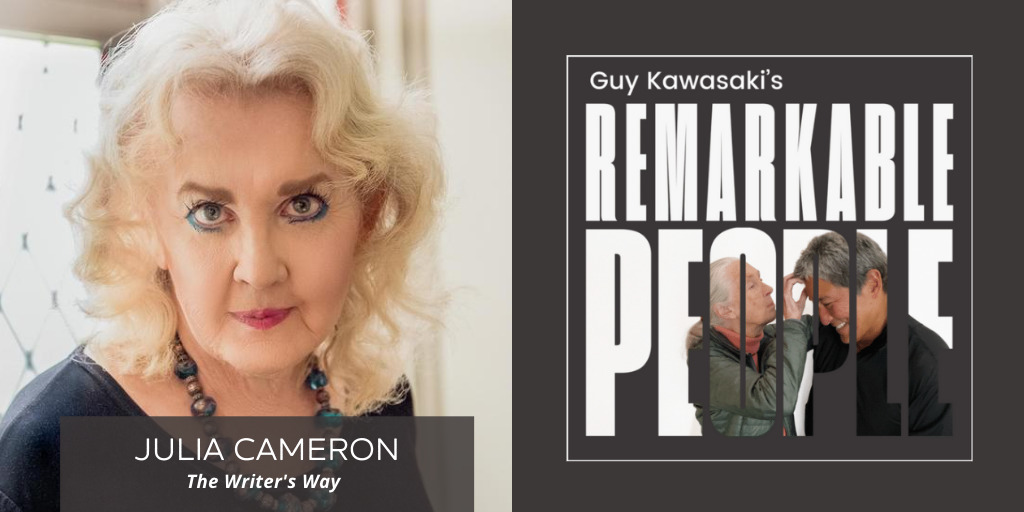
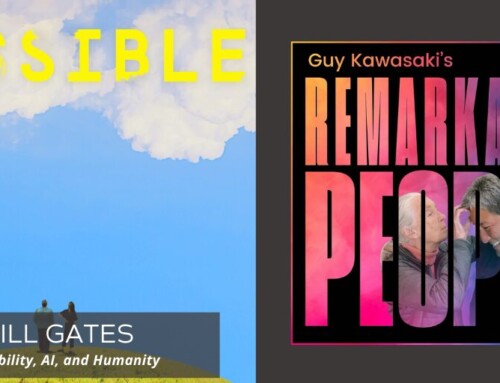
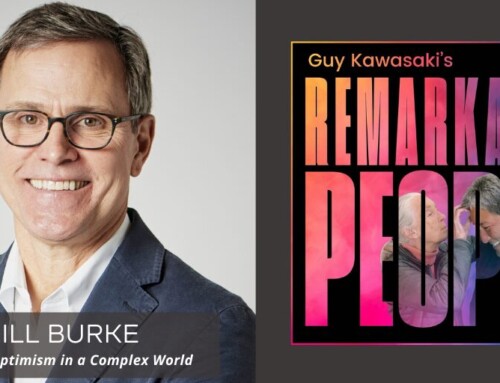
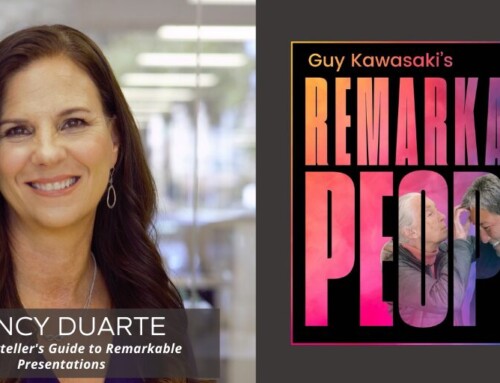
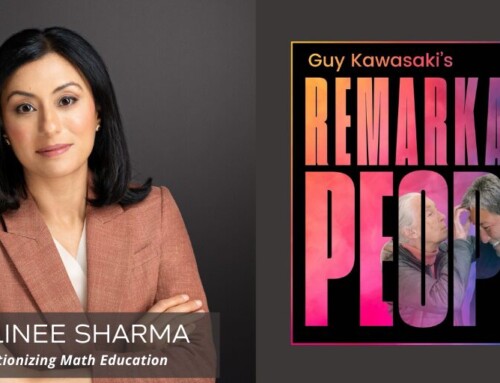
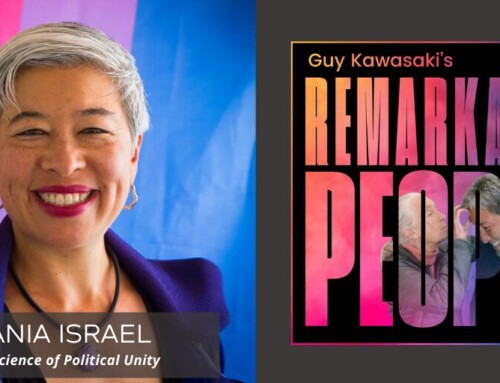
Leave a Reply